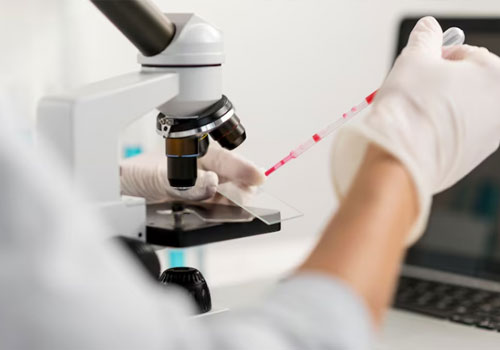| |
|
|
|
Clinical Pathology Services
Clinical pathology services encompass a wide range of laboratory tests and analyses aimed at diagnosing diseases and monitoring patients' health status through the examination of bodily fluids, tissues, and cells. These services are typically provided by clinical pathology laboratories and include the following:
Hematology services involve the analysis of blood components, including red blood cells, white blood cells, and platelets. Common tests include complete blood count (CBC), differential white blood cell count, hemoglobin measurement, hematocrit determination, and blood smear examination. These tests are used to diagnose anemia, infections, leukemia, and other blood disorders.
Clinical chemistry services focus on analyzing biochemical markers in blood, serum, plasma, urine, and other bodily fluids. Tests may include liver function tests (e.g., ALT, AST, bilirubin), kidney function tests (e.g., creatinine, blood urea nitrogen), electrolyte measurements (e.g., sodium, potassium), lipid profiles (e.g., cholesterol, triglycerides), and tests for glucose, proteins, enzymes, and hormones.
Immunology and serology services involve testing for antibodies, antigens, and immune system components in blood and other body fluids. Tests may include screening for infectious diseases (e.g., HIV, hepatitis, syphilis), autoimmune diseases (e.g., rheumatoid arthritis, lupus), allergy testing, and monitoring immune responses to vaccines or treatments.
Microbiology services focus on identifying and characterizing microorganisms, including bacteria, viruses, fungi, and parasites, in clinical specimens. Tests may include culture and sensitivity testing, Gram staining, acid-fast staining, antigen detection assays, and molecular methods such as PCR for diagnosing infectious diseases.
Urinalysis involves the physical, chemical, and microscopic examination of urine to assess kidney function, detect urinary tract infections, and diagnose metabolic disorders. Tests may include dipstick analysis for pH, protein, glucose, ketones, blood, and leukocytes, as well as microscopic examination of urine sediment.
Coagulation studies assess the blood's ability to clot properly and are used to diagnose bleeding disorders (e.g., hemophilia, von Willebrand disease) and monitor anticoagulant therapy (e.g., warfarin). Tests may include prothrombin time (PT), activated partial thromboplastin time (aPTT), international normalized ratio (INR), and specific factor assays.
Cytology and pathology services involve the examination of cells and tissues under a microscope to diagnose cancer, infections, inflammatory conditions, and other diseases. Tests may include fine-needle aspiration (FNA), Pap smears, biopsy interpretation, and special staining techniques to identify specific cell types and structures.
Molecular diagnostics involve the detection and analysis of nucleic acids (DNA, RNA) in clinical specimens to diagnose genetic disorders, infectious diseases, and certain types of cancer. Tests may include PCR, nucleic acid sequencing, and hybridization techniques such as FISH and PCR-based assays for detecting specific genetic mutations or infectious agents.

|
|
|
|
|